人教PEP(2014秋)小升初总复习-专项提升 第四部分 时态精析 第二节 一般现在时 (共19张PPT)
文档属性
| 名称 | 人教PEP(2014秋)小升初总复习-专项提升 第四部分 时态精析 第二节 一般现在时 (共19张PPT) | 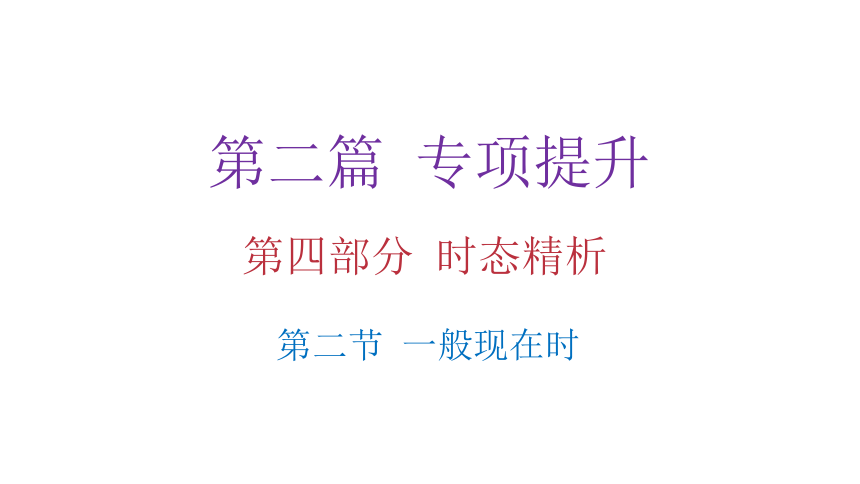 | |
| 格式 | pptx | ||
| 文件大小 | 87.4KB | ||
| 资源类型 | 教案 | ||
| 版本资源 | 人教版(PEP) | ||
| 科目 | 英语 | ||
| 更新时间 | 2020-07-13 20:40:20 | ||
图片预览

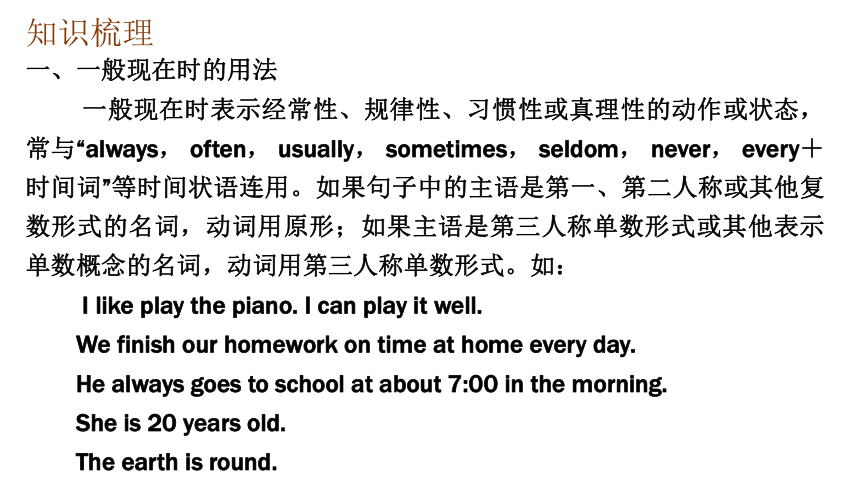
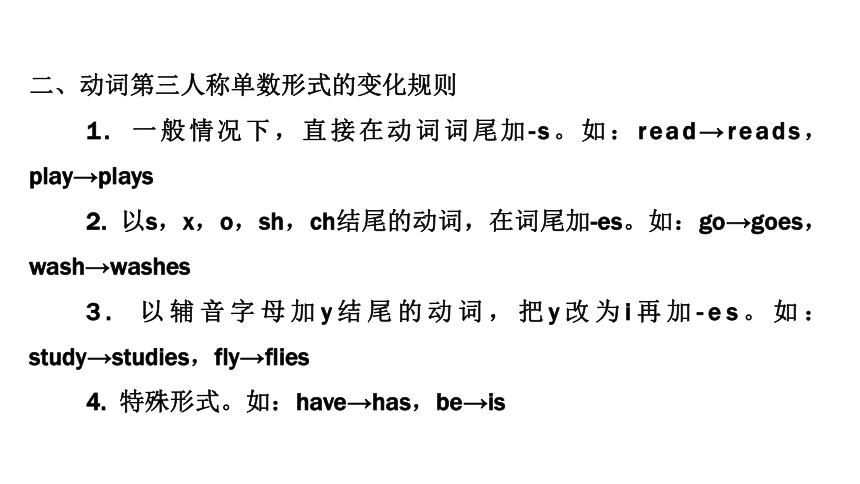
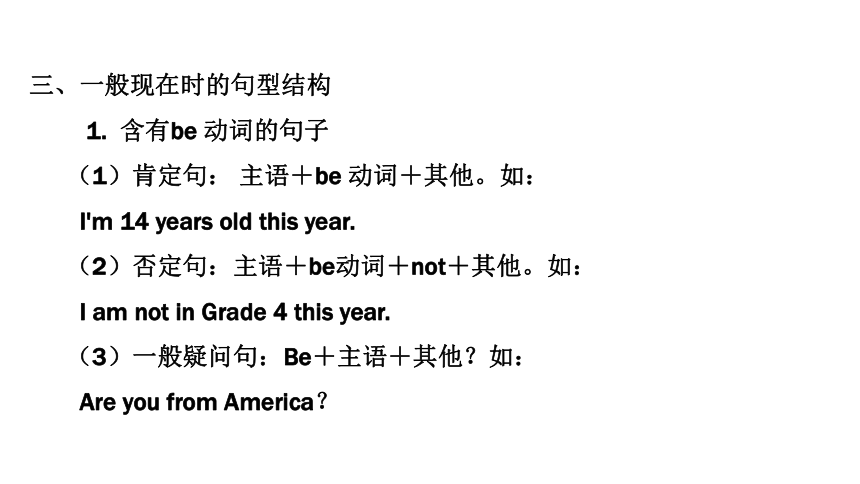
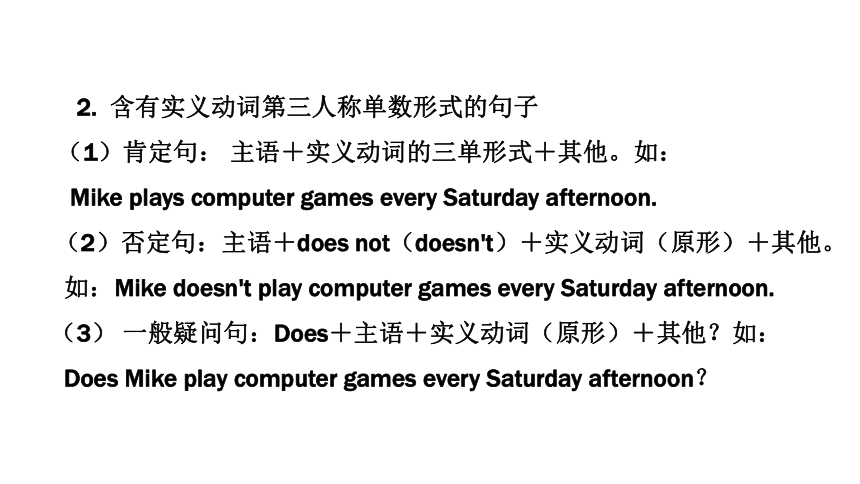
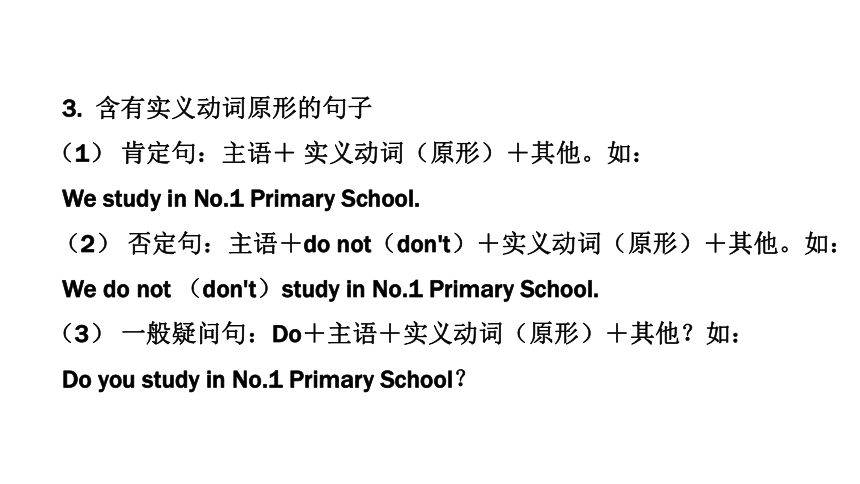
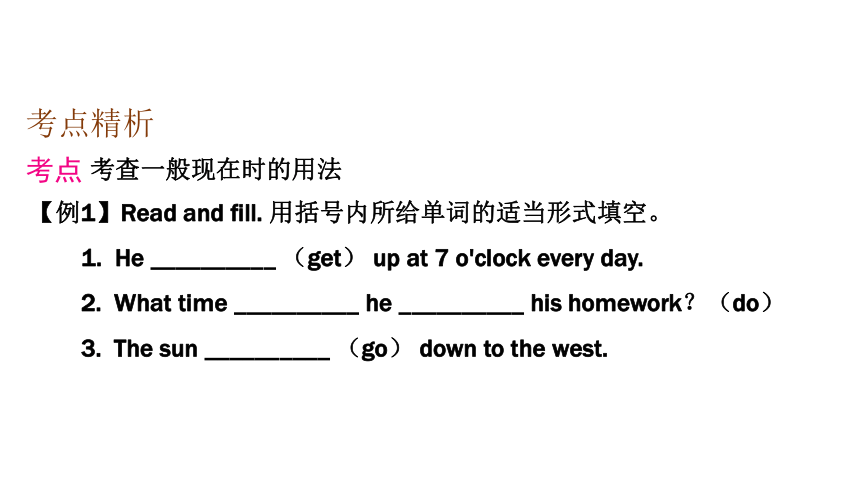
文档简介
第二篇 专项提升
第四部分 时态精析
第二节 一般现在时
知识梳理
一、一般现在时的用法
一般现在时表示经常性、规律性、习惯性或真理性的动作或状态,常与“always, often, usually, sometimes, seldom, never, every+时间词”等时间状语连用。如果句子中的主语是第一、第二人称或其他复数形式的名词,动词用原形;如果主语是第三人称单数形式或其他表示单数概念的名词,动词用第三人称单数形式。如:
I like play the piano. I can play it well.
We finish our homework on time at home every day.
He always goes to school at about 7:00 in the morning.
She is 20 years old.
The earth is round.
二、动词第三人称单数形式的变化规则
1. 一般情况下,直接在动词词尾加-s。如:read→reads,play→plays
2. 以s,x,o,sh,ch结尾的动词,在词尾加-es。如:go→goes,wash→washes
3. 以辅音字母加y结尾的动词,把y改为i再加-es。如:study→studies,fly→flies
4. 特殊形式。如:have→has,be→is
三、一般现在时的句型结构
1. 含有be 动词的句子
(1)肯定句: 主语+be 动词+其他。如:
I'm 14 years old this year.
(2)否定句:主语+be动词+not+其他。如:
I am not in Grade 4 this year.
(3)一般疑问句:Be+主语+其他?如:
Are you from America?
2. 含有实义动词第三人称单数形式的句子
(1)肯定句: 主语+实义动词的三单形式+其他。如:
Mike plays computer games every Saturday afternoon.
(2)否定句:主语+does not(doesn't)+实义动词(原形)+其他。
如:Mike doesn't play computer games every Saturday afternoon.
(3) 一般疑问句:Does+主语+实义动词(原形)+其他?如:
Does Mike play computer games every Saturday afternoon?
3. 含有实义动词原形的句子
(1) 肯定句:主语+ 实义动词(原形)+其他。如:
We study in No.1 Primary School.
(2) 否定句:主语+do not(don't)+实义动词(原形)+其他。如:
We do not (don't)study in No.1 Primary School.
(3) 一般疑问句:Do+主语+实义动词(原形)+其他?如:
Do you study in No.1 Primary School?
考点精析
考查一般现在时的用法
考点
【例1】Read and fill. 用括号内所给单词的适当形式填空。
1. He __________ (get) up at 7 o'clock every day.
2. What time __________ he __________ his homework?(do)
3. The sun __________ (go) down to the west.
解析:本题考查正确填写动词的形式。在做这类题的时候,要先判断句子的时态。第1、2小题分别体现经常性和习惯性,应该用一般现在时,而he是第三人称,故动词要用三单形式,助动词用does; 第3小题太阳西下是自然规律,用一般现在时。
答案:1. 2. 3.
gets
does;do
goes
【例2】Listen and choose. 听问句,选择最合适的应答句,并将其字母编号填在括号内。
( )1. A. I can play basketball. B. I often play basketball.
( )2. A. I am in the kitchen. B. She is in the kitchen.
( )3. A. Yes, he can. B. Yes, he does.
听力材料:1. What do you often do after school?
2. Where is your mother?
3. Can he swim?
解析:本题考查一般现在时在情景问答中的运用。第1题是对主语的经常性、习惯性动作的提问;第2题的干扰项是主语;第3题问句是用can提问的一般疑问句,故应用can来回答。
答案:1. 2. 3.
B
A
B
举一反三
一、Read and fill. 用括号内所给单词的适当形式填空。
1. He often __________ (have) dinner at home.
2. The boy always __________ (teach) his sister maths after dinner.
3. We ______________ (not watch) TV on Mondays.
4. Mike and his father sometimes __________ (read) newspapers together.
5. Jack ______________ (not ride) a bike to school on Fridays.
has
teaches
don't watch
read
doesn't ride
二、Ask and answer. 根据答句写问句。
1. A: ________________________________________
B: My sister can sing and dance.
2. A: ________________________________________
B: No, my father isn't at home.
3. A: ________________________________________
B: He usually reads books in the park.
What can your sister do?
Is your father at home?
What does he usually do in the park?
过关检测
一、Read and write. 写出下列动词的第三人称单数形式。
1. sit __________ 2. swim __________
3. go __________ 4. make __________
5. run __________ 6. study __________
7. watch __________ 8. wash __________
9. say __________ 10. play __________
11. be __________ 12. have__________
sits
swims
goes
makes
runs
studies
watches
washes
says
plays
is
has
二、Read and choose. 单项填空。
( )1. He __________ to school from Monday to Friday.
A. go B. goes C. going
( )2. The earth __________ around the sun.
A. moving B. moves C. moved
( )3. Miss Li __________ music.
A. teaches our B. teaches us C. teach our
( )4. __________ Linda __________ back at seven every day?
A. Is; coming B. Does; comes C. Does; come
B
B
B
C
( )5. Lily doesn't __________ a music lesson in the afternoon.
A. have B. has C. having
( )6. What __________ your mother often __________ on
Sundays?
A. is; doing B. does; do C. do; does
( )7. I __________ apples and she __________ pears.
A. like; like B. like; likes C. likes; likes
A
B
B
三、Read and fill. 用括号内所给单词的适当形式填空。
1. My father __________ (be) at home today.
2. Jane and Joe __________ (be) students. They __________ (be) in the park now.
3. __________ (be) you a bus driver?
4. We often __________ (play) on the playground.
5. He __________ (get) up at six o'clock every day.
6. __________ (do) you __________ (brush) your teeth every morning?
7. What __________ he usually __________ after school? (do)
is
are
are
Are
play
gets
Do
brush
does
do
8. Danny __________ (study) English, Chinese, maths, science and art at school.
9. Mike sometimes __________ (go) to the park with his sister.
10. __________ (do)Mike __________(read) English every day?
11. How many lessons __________ (do)your classmates __________ (have) on Monday?
12. What time __________ his mother __________ the housework?(do)
studies
goes
Does
read
do
have
does
do
四、Ask and answer. 根据答句写问句。
1. A: __________________________________________________
B: I can wash the clothes.
2. A: __________________________________________________
B: I often clean the room at home.
What can you do?
What do you often do at home?
3. A: __________________________________________________
B: Yes, she often goes shopping on the weekend.
4. A: __________________________________________________
__________________________________________________
B: My brother likes drawing pictures.
5. A: __________________________________________________
B: No, he is a doctor.
Does she often go shopping on the weekend?
What's your brother's hobby?/What does your brother like
doing?
Is he a driver/teacher/farmer …?
第四部分 时态精析
第二节 一般现在时
知识梳理
一、一般现在时的用法
一般现在时表示经常性、规律性、习惯性或真理性的动作或状态,常与“always, often, usually, sometimes, seldom, never, every+时间词”等时间状语连用。如果句子中的主语是第一、第二人称或其他复数形式的名词,动词用原形;如果主语是第三人称单数形式或其他表示单数概念的名词,动词用第三人称单数形式。如:
I like play the piano. I can play it well.
We finish our homework on time at home every day.
He always goes to school at about 7:00 in the morning.
She is 20 years old.
The earth is round.
二、动词第三人称单数形式的变化规则
1. 一般情况下,直接在动词词尾加-s。如:read→reads,play→plays
2. 以s,x,o,sh,ch结尾的动词,在词尾加-es。如:go→goes,wash→washes
3. 以辅音字母加y结尾的动词,把y改为i再加-es。如:study→studies,fly→flies
4. 特殊形式。如:have→has,be→is
三、一般现在时的句型结构
1. 含有be 动词的句子
(1)肯定句: 主语+be 动词+其他。如:
I'm 14 years old this year.
(2)否定句:主语+be动词+not+其他。如:
I am not in Grade 4 this year.
(3)一般疑问句:Be+主语+其他?如:
Are you from America?
2. 含有实义动词第三人称单数形式的句子
(1)肯定句: 主语+实义动词的三单形式+其他。如:
Mike plays computer games every Saturday afternoon.
(2)否定句:主语+does not(doesn't)+实义动词(原形)+其他。
如:Mike doesn't play computer games every Saturday afternoon.
(3) 一般疑问句:Does+主语+实义动词(原形)+其他?如:
Does Mike play computer games every Saturday afternoon?
3. 含有实义动词原形的句子
(1) 肯定句:主语+ 实义动词(原形)+其他。如:
We study in No.1 Primary School.
(2) 否定句:主语+do not(don't)+实义动词(原形)+其他。如:
We do not (don't)study in No.1 Primary School.
(3) 一般疑问句:Do+主语+实义动词(原形)+其他?如:
Do you study in No.1 Primary School?
考点精析
考查一般现在时的用法
考点
【例1】Read and fill. 用括号内所给单词的适当形式填空。
1. He __________ (get) up at 7 o'clock every day.
2. What time __________ he __________ his homework?(do)
3. The sun __________ (go) down to the west.
解析:本题考查正确填写动词的形式。在做这类题的时候,要先判断句子的时态。第1、2小题分别体现经常性和习惯性,应该用一般现在时,而he是第三人称,故动词要用三单形式,助动词用does; 第3小题太阳西下是自然规律,用一般现在时。
答案:1. 2. 3.
gets
does;do
goes
【例2】Listen and choose. 听问句,选择最合适的应答句,并将其字母编号填在括号内。
( )1. A. I can play basketball. B. I often play basketball.
( )2. A. I am in the kitchen. B. She is in the kitchen.
( )3. A. Yes, he can. B. Yes, he does.
听力材料:1. What do you often do after school?
2. Where is your mother?
3. Can he swim?
解析:本题考查一般现在时在情景问答中的运用。第1题是对主语的经常性、习惯性动作的提问;第2题的干扰项是主语;第3题问句是用can提问的一般疑问句,故应用can来回答。
答案:1. 2. 3.
B
A
B
举一反三
一、Read and fill. 用括号内所给单词的适当形式填空。
1. He often __________ (have) dinner at home.
2. The boy always __________ (teach) his sister maths after dinner.
3. We ______________ (not watch) TV on Mondays.
4. Mike and his father sometimes __________ (read) newspapers together.
5. Jack ______________ (not ride) a bike to school on Fridays.
has
teaches
don't watch
read
doesn't ride
二、Ask and answer. 根据答句写问句。
1. A: ________________________________________
B: My sister can sing and dance.
2. A: ________________________________________
B: No, my father isn't at home.
3. A: ________________________________________
B: He usually reads books in the park.
What can your sister do?
Is your father at home?
What does he usually do in the park?
过关检测
一、Read and write. 写出下列动词的第三人称单数形式。
1. sit __________ 2. swim __________
3. go __________ 4. make __________
5. run __________ 6. study __________
7. watch __________ 8. wash __________
9. say __________ 10. play __________
11. be __________ 12. have__________
sits
swims
goes
makes
runs
studies
watches
washes
says
plays
is
has
二、Read and choose. 单项填空。
( )1. He __________ to school from Monday to Friday.
A. go B. goes C. going
( )2. The earth __________ around the sun.
A. moving B. moves C. moved
( )3. Miss Li __________ music.
A. teaches our B. teaches us C. teach our
( )4. __________ Linda __________ back at seven every day?
A. Is; coming B. Does; comes C. Does; come
B
B
B
C
( )5. Lily doesn't __________ a music lesson in the afternoon.
A. have B. has C. having
( )6. What __________ your mother often __________ on
Sundays?
A. is; doing B. does; do C. do; does
( )7. I __________ apples and she __________ pears.
A. like; like B. like; likes C. likes; likes
A
B
B
三、Read and fill. 用括号内所给单词的适当形式填空。
1. My father __________ (be) at home today.
2. Jane and Joe __________ (be) students. They __________ (be) in the park now.
3. __________ (be) you a bus driver?
4. We often __________ (play) on the playground.
5. He __________ (get) up at six o'clock every day.
6. __________ (do) you __________ (brush) your teeth every morning?
7. What __________ he usually __________ after school? (do)
is
are
are
Are
play
gets
Do
brush
does
do
8. Danny __________ (study) English, Chinese, maths, science and art at school.
9. Mike sometimes __________ (go) to the park with his sister.
10. __________ (do)Mike __________(read) English every day?
11. How many lessons __________ (do)your classmates __________ (have) on Monday?
12. What time __________ his mother __________ the housework?(do)
studies
goes
Does
read
do
have
does
do
四、Ask and answer. 根据答句写问句。
1. A: __________________________________________________
B: I can wash the clothes.
2. A: __________________________________________________
B: I often clean the room at home.
What can you do?
What do you often do at home?
3. A: __________________________________________________
B: Yes, she often goes shopping on the weekend.
4. A: __________________________________________________
__________________________________________________
B: My brother likes drawing pictures.
5. A: __________________________________________________
B: No, he is a doctor.
Does she often go shopping on the weekend?
What's your brother's hobby?/What does your brother like
doing?
Is he a driver/teacher/farmer …?
